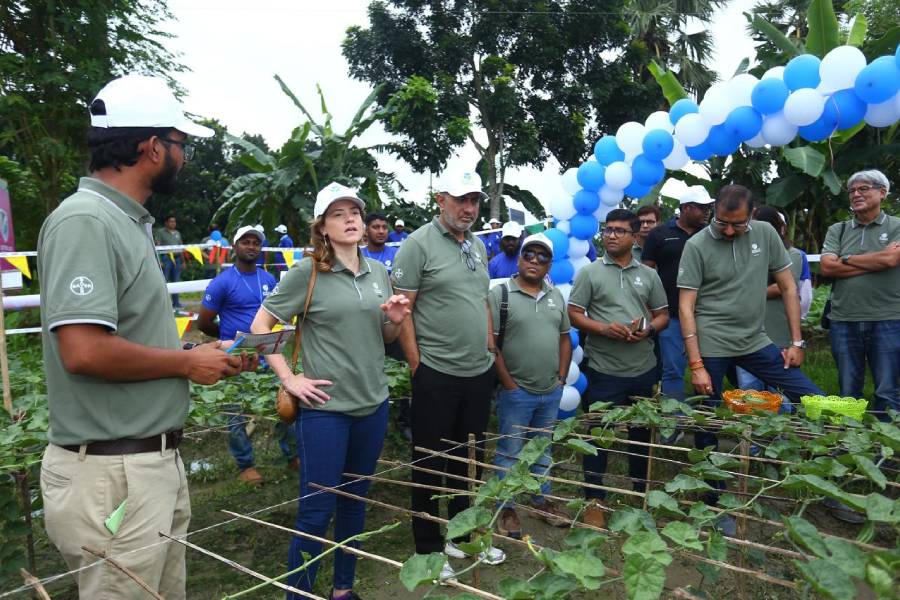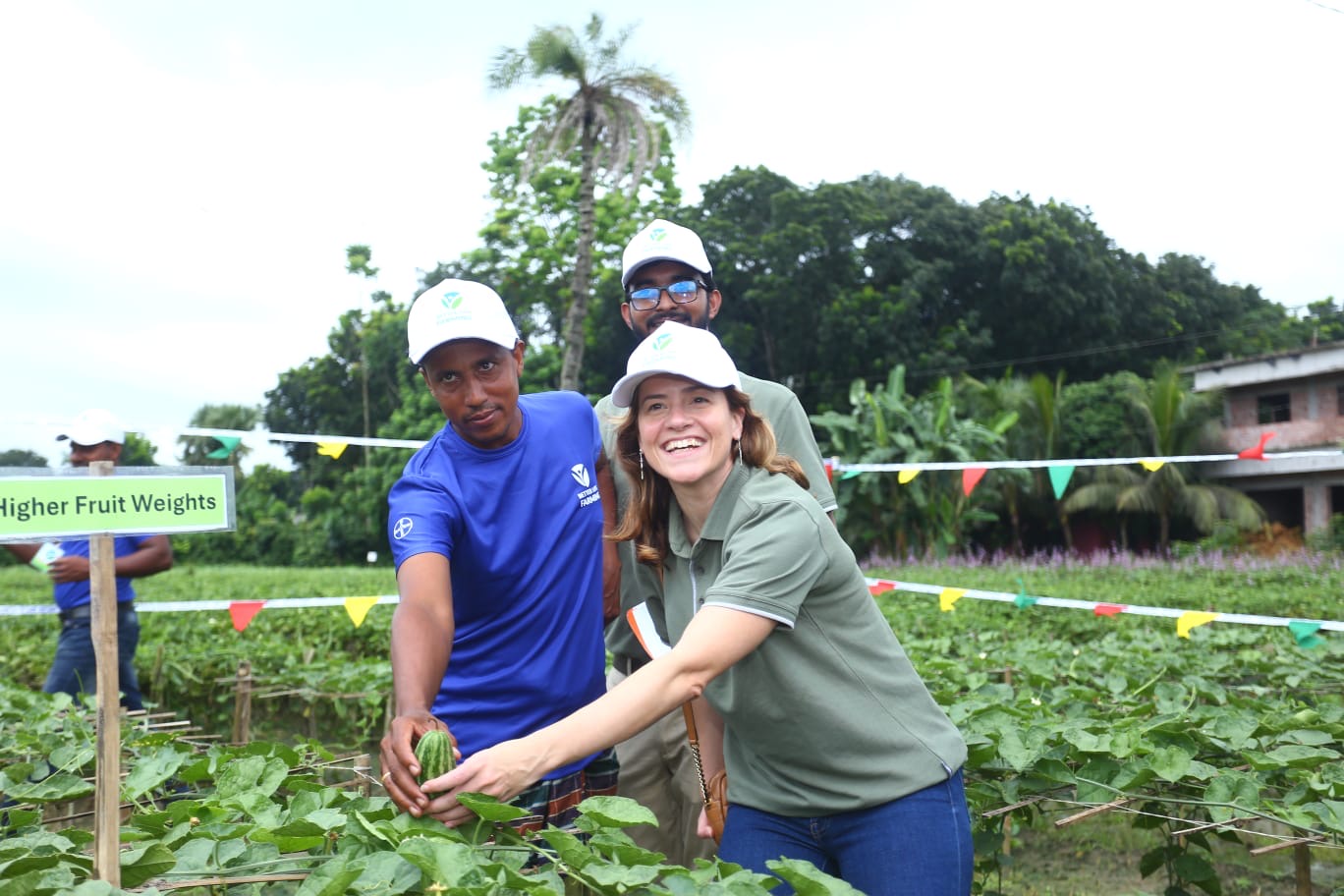
Published :
Updated :

To meet the consumption need of an ever-expanding population across the globe it is important to increase production of food, feed and fibre. However, while doing so, it is equally important to refrain from harming the ecosystems. Natasha Santos, Global Head of Sustainability and Strategic Engagement at Bayer’s recently paid a brief visit to Bangladesh. Ms Natasha while talking to The Financial Express explained how Bayer tries to maintain a balance through the application of innovative technology in agriculture to improve crop yields with least environmental impact. Excerpts of the interview follow:
Question (Q): “As the Head of Sustainability & Strategic Engagement, could you share your long-term vision for sustainability in agriculture and how Bayer Crop Science plans to contribute to global sustainability goals?”
Answer (A): Our long-term vision for sustainability in agriculture is rooted in a mission of transformational balance: to meet the growing food, feed, and fiber needs of a rapidly expanding and changing population, while actively restoring ecosystems, reducing emissions, and enabling resilient livelihoods. In short, feed the world without starving the planet.
To realise that, I see three interlocking strategic pillars for the next 10–20 years:
Embed sustainability into innovation and business models
Sustainability is not an add-on but a core driver of innovation. Every new solution must deliver across three dimensions: productivity, environmental stewardship, and social impact. This means embedding sustainability into R&D, product design, deployment, and performance metrics
Empower smallholders through inclusion and partnerships
Lasting impact requires that we reach beyond products to co-create holistic solutions for farmers, especially the millions of smallholders who form the backbone of global food systems. This means coupling sustainable inputs with education, finance, market access, and digital tools that unlock smarter, data-driven farming. We recognize that no single player in the ecosystem can deliver this transformation alone; hence, we build multi-stakeholder partnerships across governments, NGOs, academia, and farmer groups to scale systemic change.
Reduce agriculture’s environmental footprint
Our ambition is to deliver more food with fewer resources while restoring natural ecosystems. We are committed to cutting greenhouse gas emissions by 30% in major crop systems, advancing soil carbon sequestration, and innovating in low-impact crop protection and resilient genetics. By leveraging carbon-smart practices, bio-based inputs, precision application, and digital agriculture, we can reconcile the need to protect yields with the imperative to preserve the environment. For example, DirectAcres supports farmers with a sustainable cropping system approach to Direct Seeded Rice, reducing water use and improving resilience, while The Good Rice Alliance focuses on lowering the carbon footprint of rice cultivation through global collaboration.
In short, the long-term vision is to make sustainability inseparable from how agriculture and agribusiness operate, not as an afterthought, but as a core driver of innovation and competitive advantage. Bayer Crop Science, with its scientific capabilities, global reach, partnerships, and ambition, aims to be a catalyst and enabler, helping transform the agricultural systems of tomorrow so they are productive, resilient, inclusive, and regenerative.

Q: “Can you elaborate how Bayer integrates innovative technologies in agriculture to reduce environmental impact and improve crop yields?”
A: At Bayer, we see innovation as the most powerful lever to make agriculture both more productive and more sustainable. Bangladesh’s agriculture sector holds immense potential, driven by a large population and growing food demand, creating a prime opportunity for innovative solutions. The country’s strong agricultural backbone aligns with Bayer’s mission to transform farming through technology, productivity, and sustainability
Additionally, digital technologies are a game-changer; we're exploring collaborations with startups and Agri-tech platforms to accelerate digital transformation, all with the broader goal of meeting the growing need for nutritional security for 220 million Bangladeshi's, while also enabling potential export opportunities in the future.
Q:“ How is BLF helping smallholder farmers' empowerment and creating Agri Entrepreneursin rural geography?”
A: With an objective to provide holistic and innovative solutions for smallholder farmers in developing economies, Bayer, International Finance Corporation (IFC, a member of the World Bank Group),and others launched the ‘Better Life Farming’ (BLF) alliance in 2018. The alliance was launched in Bangladesh on November 24, 2020.
BLF seeks to enhance the income and living standards of smallholder farmers by providing holistic solutions both on and off the crop field, primarily through increased yields and the smart utilization of resources. With approximately 1,000 BLF centres nationwide, Bayer is connecting with smallholder farmers to offer innovative crop protection solutions and high-yield hybrid seeds. We also share knowledge of modern agricultural technology through extensive training sessions, result demonstrations, and method showcases led by dedicated agronomists.
As part of Bayer’s stewardship commitment, BLF promotes the safe use of crop protection products among farmers. Additionally, we are exploring collaborations with technology, nutrient, and other industries to address needs beyond quality seeds and crop protection solutions.
Bayer has set an SDG goal to empower 100 million smallholder farmers worldwide by 2030. The Better Life Farming (BLF) initiative is a key global effort aimed at achieving this goal. Bangladesh is a key target country for Bayer’s BLF initiative, which is rapidly expanding its reach within the country.
Q: How is the BLF alliance collaborating with Partners to support smallholder farmers, especially in countries like Bangladesh?
A: In Bangladesh, the BLF alliance includes global partners: Bayer with its expertise in seeds, crop protection, and agronomy; IFC, the development finance institution for impact assessment, and some local partners to create awareness & ensure inputs for farmers in other needs. The overall objective is to support smallholder farmers to increase crop yields and farm incomes through sustainable agriculture and agri-entrepreneurship.
Q: “How does a country like Bangladesh benefit from BLF, where smallholder farmers playa pivotal role?”
A: Bangladesh benefits significantly from Better Life Farming, especially because smallholder farmers form the backbone of the country’s agriculture. The program creates value in several ways:
- Empowering smallholders:
The initiative equips farmers with access to modern agricultural practices, training, and innovative tools, helping them improve productivity on small plots of land. This is critical in Bangladesh, where most farmers cultivate less than two hectares. - Boosting yields and income:
By promoting sustainable farming practices, such as efficient water use, better seed varieties, and crop protection solutions, BLF helps farmers increase yields and reduce crop losses. This directly translates into higher household incomes and improved livelihoods. - Climate resilience:
Given Bangladesh’s vulnerability to floods, salinity, and climate change, BLF’s support in introducing climate-smart agriculture helps farmers adapt, safeguard harvests, and maintain food security. - Food security & nutrition:
By strengthening productivity and market linkages, the initiative ensures a more stable food supply, contributing to national food security and improved nutrition for communities. - Community development:
BLF projects often go beyond agriculture, supporting education, women's empowerment, and rural entrepreneurship, helping to uplift entire farming communities.
Q: “How does Bayer measure the success of its sustainability initiatives? Are there specific metrics or benchmarks that you track to ensure progress?”
A: At Bayer, we measure the success of our sustainability initiatives through clear, time-bound targets and independent impact assessments. For example, by 2030, we aim to support 100 million smallholder farmers, reduce on-field greenhouse gas emissions from the highest-emitting crop systems by 30%, cut the environmental impact of our crop protection portfolio by 30%, and improve water productivity in rice systems by 20-25%. These are benchmarked against defined baselines and validated through globally recognized methodologies such as life-cycle assessments, PestLCI, USEtox®, and the Science Based Targets initiative.
Equally important, we go beyond environmental metrics to track real changes in farmers’ lives. Using baseline and follow-up surveys, we measure improvements in yields, incomes, adoption of sustainable practices, and perceived quality of life. Independent partners like 60 Decibels validate these findings, ensuring that our efforts align with what farmers and communities truly value. By combining quantitative outcomes with farmer perceptions, benchmarking against external standards, and reporting transparently, we hold ourselves accountable and ensure that sustainability is not only integral to our business but also meaningful for the people and ecosystems we serve.


 For all latest news, follow The Financial Express Google News channel.
For all latest news, follow The Financial Express Google News channel.